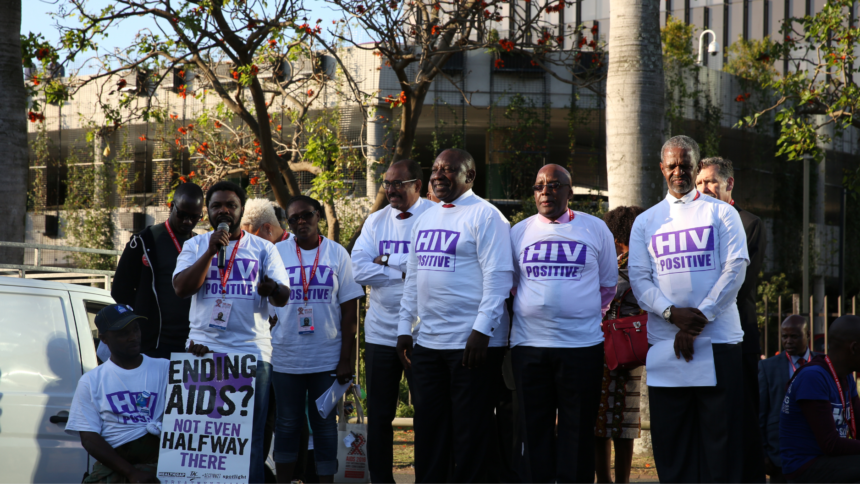The Health and Human Rights Oral History Project has recently launched a series of video testimonies that capture three decades of health activism from around the world. This project, which features 29 health rights activists, including prominent figures like Sisonke Msimang and Vuyiseka Dubula, may provide a blueprint for the next wave of HIV activism.
In a time when the world is reeling from the Trump administration’s drastic cuts to funding of HIV programs and research studies, the Health and Human Rights Oral History Project stands as a testament to the power of activism in shaping health policy. In South Africa, where more than half of HIV and TB projects funded by the US government’s Aids fund, Pepfar, have closed down or are in the process of closing down, the need for urgent action is clear.
A modelling study conducted by Wits University’s HE²RO project has projected that without replacing the funding from the US government, there could be between 150,000 and 295,000 new HIV infections in the next four years. This could lead to a 38% increase in Aids-related deaths. The study highlights the urgent need for government intervention to prevent this potential crisis.
The cost to contain these numbers is estimated at R2.82 billion, a significant amount that activists are calling on the government to provide. Sasha Stevenson, from the social justice organization Section27, emphasizes the need for urgency in reversing the funding cuts and ensuring full funding of health programs.
Looking back at the history of HIV activism in South Africa, the video testimonies in the archive provide unique insights into the struggles and triumphs of past movements. From the landmark legal victory in 2002 that secured access to lifesaving treatment for HIV-positive pregnant women to the recent Life Esidimeni inquiry, which held government officials accountable for the deaths of mental health patients, activism has played a crucial role in shaping health policy.
The archive serves as a reminder that activism can take many forms, from public protests to legal battles, and that history cannot be erased. By learning from the past and drawing inspiration from the stories of past activists, the next wave of HIV activism can build on the successes of the past and continue to push for positive change in health policy. Telling stories from the archive is crucial for turning key moments into history, according to Noor Nieftagodien, head of the history workshop at Wits University. He emphasizes that journalists, activists, and researchers must tap into these stories, especially in the current climate of Trumpism where human rights activism is urgently needed.
The lessons from the archive highlight the importance of organizing and mobilizing people around a cause to achieve results, says Nieftagodien.
Fatima Hassan, founder and director of the Health Justice Initiative, believes that in 20 years, people will look back on 2025 and want to know the full story of how individuals responded to various challenges. She points out that while oral histories provide courage, activism today is more complex, particularly in dealing with a government of national unity in South Africa.
The Health Justice Initiative, along with other civil society organizations, has been advocating for clarity and progress on plans to address the consequences of US funding cuts. Despite efforts to engage the government, progress has been slow, frustrating activists like Hassan.
Mark Heywood, a founding member of the Treatment Action Campaign (TAC), notes that activism has become compromised as activists become involved in policy processes. The close collaboration between activists and the government in South Africa reflects some success in holding the government accountable for its health obligations.
The recent funding crisis, particularly the shutdown of USAid, has exposed the reliance of civil society on external funding for activism. Mluleki Zazini, director of the National Association of People Living with HIV and AIDS, suggests a return to grassroots activism to amplify the voices of those affected by funding cuts.
Overall, the need to hold the state accountable remains a priority for activists, who believe that working with the government is essential but also challenging. As the landscape of activism evolves, the importance of storytelling and preserving history through archives becomes increasingly significant.
The online launch of the archive was moderated by Mia Malan from Bhekisisa, a center for health journalism. Stay updated with the latest health news by subscribing to their newsletter. The field of artificial intelligence (AI) has been progressing rapidly in recent years, with advancements in machine learning, natural language processing, and computer vision leading to a wide range of applications across various industries. From self-driving cars to personalized healthcare, AI has the potential to revolutionize the way we live and work.
One of the key areas where AI is making a significant impact is in the field of healthcare. With the ability to analyze vast amounts of data quickly and accurately, AI systems are being used to diagnose diseases, develop personalized treatment plans, and improve patient outcomes. For example, researchers have developed AI algorithms that can detect early signs of diseases such as cancer and Alzheimer’s, enabling healthcare providers to intervene sooner and improve patient outcomes.
In addition to diagnosis and treatment, AI is also being used to streamline administrative tasks and improve the overall efficiency of healthcare systems. AI-powered chatbots are being used to assist patients with scheduling appointments, answering basic medical questions, and providing medication reminders. This not only saves time for healthcare providers but also improves the overall patient experience by providing quick and convenient access to information and support.
Furthermore, AI is being used to analyze healthcare data on a large scale, enabling researchers to identify patterns and trends that can lead to new insights and discoveries. By analyzing electronic health records, genomic data, and medical imaging, AI algorithms can help researchers identify new treatments, predict disease outbreaks, and improve the overall quality of care.
While the potential benefits of AI in healthcare are significant, there are also challenges and ethical considerations that must be addressed. For example, there are concerns about data privacy and security, as well as the potential for bias in AI algorithms. It is essential for healthcare providers and policymakers to implement safeguards and regulations to ensure that AI is used responsibly and ethically.
Overall, the integration of AI in healthcare has the potential to revolutionize the way we approach healthcare delivery, diagnosis, and treatment. By harnessing the power of AI, we can improve patient outcomes, increase efficiency, and drive innovation in the field of healthcare. As AI continues to advance, we can expect to see even more exciting developments that will benefit patients, healthcare providers, and society as a whole.








